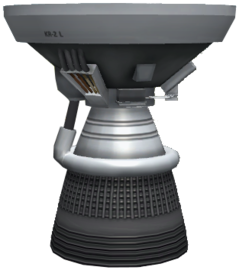Kerbodyne KR-2L+ "Rhino" Liquid Fuel Engine
| Kerbodyne KR-2L+ "Rhino" Liquid Fuel Engine | ||
| Liquid fuel engine by Kerbodyne | ||
| Radial size | Extra large | |
| Cost | (total) | 25 000.00 |
| Mass | (total) | 9.000 t |
| Drag | 0.2 | |
| Max. Temp. | 2000 K | |
| Impact Tolerance | 7 m/s | |
| Research | | |
| Unlock cost | 68 000 | |
| Since version | 0.23.5 | |
| Part configuration | part.cfg | |
| Maximum thrust | (1 atm) | 1 205.88 kN |
| (vacuum) | 2 000.00 kN | |
| Isp | (1 atm) | 205 s |
| (vacuum) | 340 s | |
| Fuel consumption | 119.97 | |
| Thrust vectoring | 4 ° | |
| Electricity generated | 12.0 ⚡/s | |
| Testing Environments | ||
| On the surface | Yes | |
| In the ocean | Yes | |
| On the launchpad | Yes | |
| In the atmosphere | Yes | |
| Sub-orbital | Yes | |
| In an orbit | Yes | |
| On an escape | Yes | |
| Docked | No | |
| Test by staging | Yes | |
| Manually testable | Yes | |
The Kerbodyne KR-2L Advanced Engine is an extra large liquid fuel engine which has a high specific impulse compared to the thrust. While the specific impulse is lower than the Rockomax "Mainsail" Liquid Engine in atmosphere, the Isp in vacuum is higher than most of the engines, including the Mainsail and Rockomax "Skipper" Liquid Engine. Only the LV-N Atomic Rocket Motor, Toroidal Aerospike Rocket, LV-909 Liquid Fuel Engine and Rockomax "Poodle" Liquid Engine are more efficient, but only have 10% (at most) of this engine's thrust.
The KR-2L might be a reference to the J-2X, a planned upper stage engine for Space Launch System.
This, and the fact that it allows attaching parts on both sides of the engine, make it a very useful engine for upper stages. Especially because the S3 KS-25x4 Engine Cluster is the only other extra large engine in 0.25 but doesn't allow attaching parts below the engine. It has the second highest thrust of all engines available.[outdated]
Product description
| “ | This engine is Kerbodyne's first attempt at a highly advanced engine. The engineers couldn't get it to produce full efficiency at sea level without the engine exploding, so it was repurposed as an upper stage engine. The experience gained here with high efficiency has been repurposed for later models, which feature multiple combustion chambers at higher pressure (that don't go boom). This engine is optimized for lighting mid-flight, although it still provides respectable power at sea level. | ” |
Changes
- Cost increased from 21000 to 25000, mass increased from 8.5 to 9, specific impulse at sea level increased from 170 to 255.
- Cost increased from 2850 to 20850 (and made meaningful)
- Initial release
